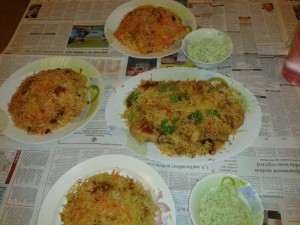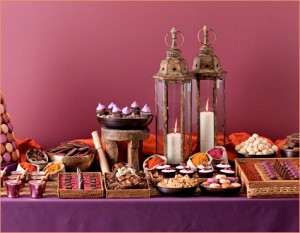As a child, I once visited my aunt in her husband’s house during Ramadan. She had dark circles around her eyes due to lack of sleep, and she was haggard and toiling in the kitchen. She told us that her husband and his brothers all had “varied” food habits when it came to breaking the fast. And since her mother-in-law was too old to help, she had to do it all herself. This image became nightmarish for me. What about Ramadan’s spiritual benefits? In this case, won’t women dread Ramadan, if it means getting no sleep and the multiplication of housework? Why is a month that is about refraining from food, made ABOUT food? Are all the spiritual benefits and group prayers exclusive to men, while women should be there tending to all their needs? It broke my heart, and worried me incessantly. Does Ramadan for adult women mean increased manual labor? I was pretty adamant that my life was not going to turn out like hers. That my Ramadan is not going to be spent serving men.
And my adult life did have something different in store for me. I started working, and moved to a different city away from my family right after college. I was single for five years after this (which is a rarity where I come from). During these years, I started to enjoy fasting in Ramadan alone. I know it’s a Sunnah to break our fast with fellow Muslims. At work, I did see these gatherings of Muslims, who didn’t usually eat together on other days, break their fast together. But I rarely joined them. The one time I did join them, they were too keen to point out everything I did as a mistake. They said I shouldn’t be drinking too much water, and most of them didn’t usually pray, so they sat and spoke for long during Iftaar, while I was aching to pray Maghrib and get back to work. So I stopped. And I broke my fast alone, drinking a huge bottle of water and praying Maghrib within 5-10 mins of iftaar. Just the way I liked it. I never had to worry about societal expectations or norms that had to be followed. Since I was in office till night, I prayed my Tarawih alone, in my office prayer room. I loved it. I had learnt to celebrate Ramadan, on my own. It helped that I had great colleagues who would never ask me to attend a meeting when it was Iftaar time, and who didn’t question if I was away for half hour during Tarawih. There were days I wished for a refrigerator or a microwave, in the place I stayed, and some company to push me to pray, on the few days that I didn’t “feel” like it. But that was about it. I believed I was blessed that I got to observe Ramadan on my own terms. I knew it was a rare privilege, especially for an adult woman.

Now that I am married, life is different. I have a refrigerator. I have a microwave. My suhoors aren’t store-bought from the day before, but home-cooked food. The biggest blessing is that I still follow my Ramadan office routine. Iftaar and four of my daily prayers I pray at work by myself. I stay in Sujood for much longer, for as much time as I want. It’s my one-on-one time with Allah.
However, my weekends have become drastically different. I have visitors, usually from my husband’s family coming over for Iftaar and sometimes staying for the whole weekend. In my year and a half of marriage, I have largely dreaded this. Dreaded visitors, dreaded having to cook sumptuous meals. Houseguests didn’t seem to bring me any joy; they only appeared to me as too much work. So last Ramadan, on weekends, I was crunched for time. My disciplined way of spending Ramadan didn’t happen, and I usually tried my best to avoid having people over. Somewhere down the line, trying hard to not be the haggard housewife, I was being unreasonable. I started to worry that I was set in my ways, and that I have been single for so long that I have forgotten to co-exist and that I have forgotten to accommodate anybody (other than my husband). This worried me.This Ramadan, I realize that conquering my fears is also an integral part of faith. On the few days when I have to let go of my personal balance, and cater to family, I try to do it to the best of my ability. I know that it is the way my prayers and faith translate into the person that I have to be. I try to find pleasure in providing for the guests who visit and stay, and I pray to Allah to give me the strength to gracefully accommodate them. I am still in the initial years of my marriage, and I am still trying hard to break-free from the single woman I have been for long. And Allah has blessed me with a great husband. So on the few days we do have visitors, I believe with Allah’s blessing that I can continue to be patient, and work hard at making a pleasing meal.

I still believe that Ramadan shouldn’t be a burden to the women in the family. I still vouch for simpler foods, and lighter Iftaars, and I am still against the posh extravagant Iftaar parties. But in trying hard NOT to become like one of those overworked haggard housewives, had also taken me away from my joy and sense of accomplishment of preparing Iftaar and Suhoor for my extended family. Yes, I am more exhausted on such days, but I have realized that being more patient, and working harder on my domestic skills, is only going to add up to my spiritual experience, and not take away from it.
I believe Allah has blessed me with the best of both worlds: my solitary Ramadan on my working days, and my family Ramadan on weekends.
This is dedicated to my amazing team at work, who has allowed me to work from home, on account of Ramadan, this week, while I support my client during the night.
For more on MMW’s Ramadan series, and to read the rest of this year’s Ramadan posts, click here.











